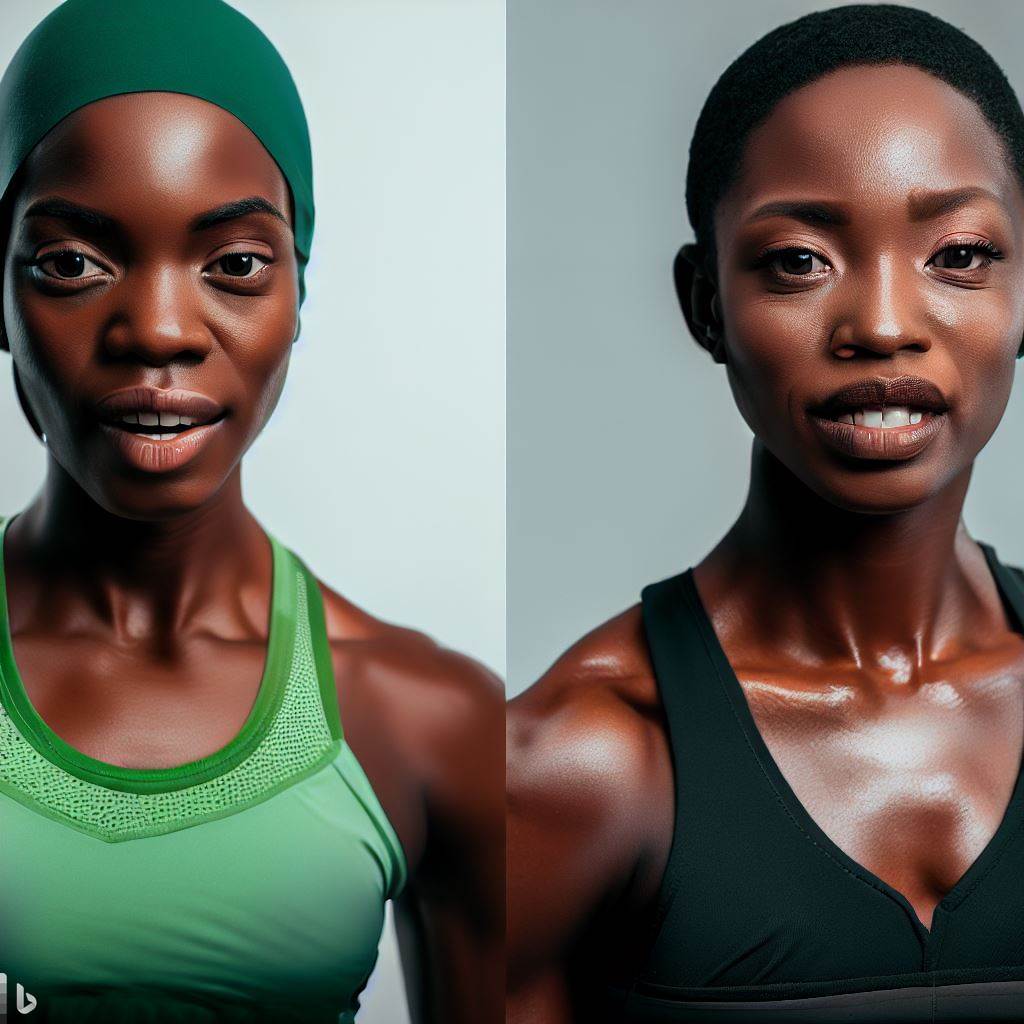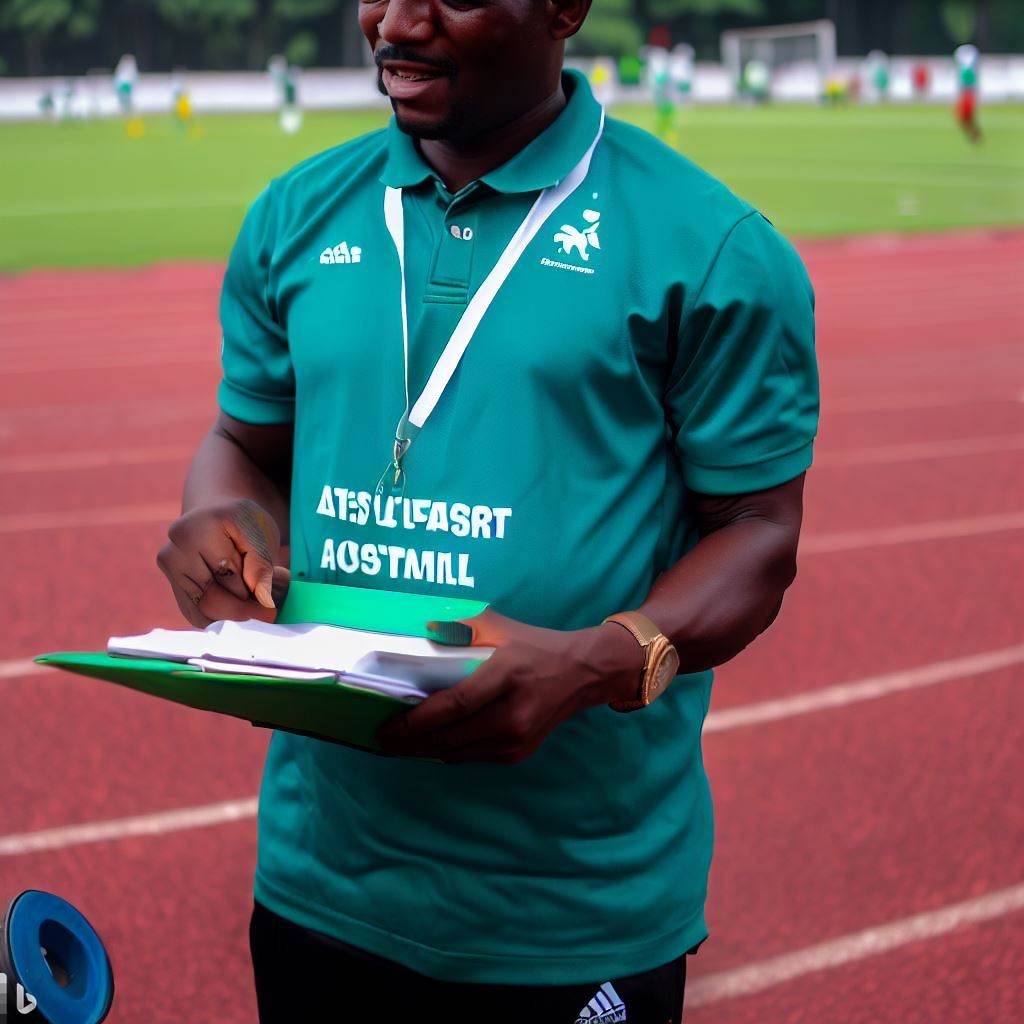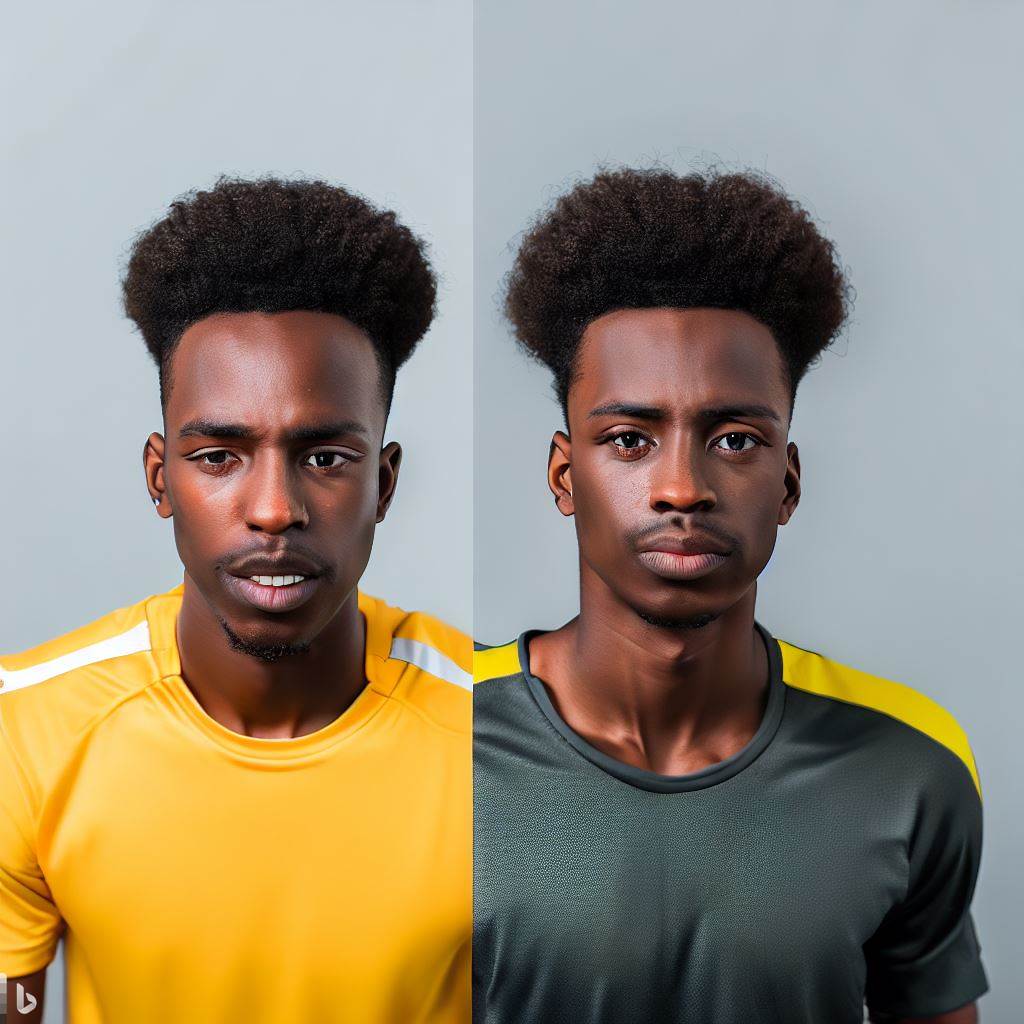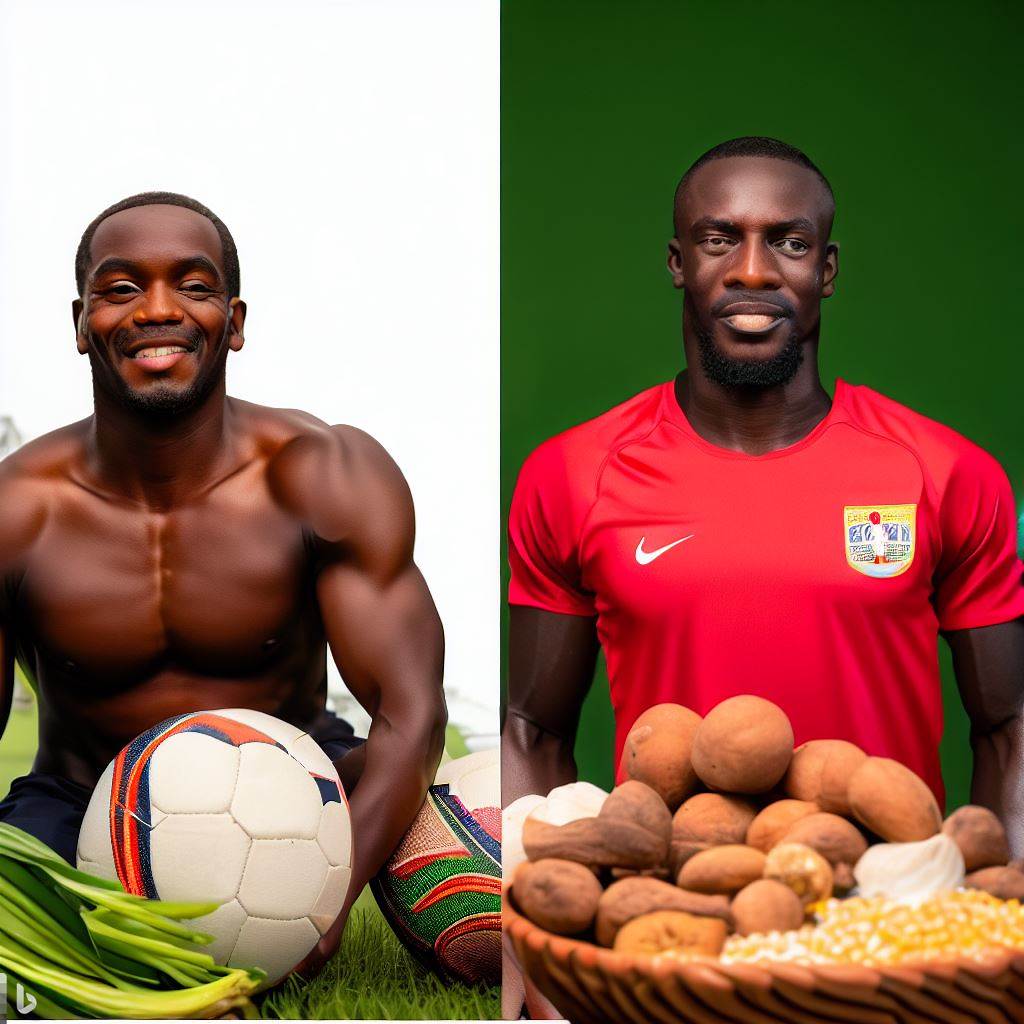Introduction
Exploring gender dynamics in this field is essential to understand the unique challenges and opportunities faced by individuals of different genders.
It can help identify any disparities and barriers that may exist in accessing fitness and nutrition resources, as well as highlight the importance of inclusivity and equality in promoting a healthy lifestyle for all Nigerians.
Historical Context of Gender Roles in Nigeria
A. Traditional gender roles and expectations in Nigerian society
- Men are typically assigned the role of breadwinners and decision-makers within the family.
- Women are expected to take care of the household chores and raise children.
- Traditional gender roles reinforce male dominance and female submissiveness.
- Women are often perceived as weaker and less capable than men.
B. Impact on women’s participation in the fitness nutrition field
- Gender stereotypes limit women’s access to education and opportunities for professional development.
- Women are discouraged from pursuing careers in fitness and nutrition due to societal expectations.
- Limited support and resources are available for women who want to enter the field.
- Women often face discrimination and bias when trying to establish themselves in the fitness nutrition industry.
- Male-dominated environments make it challenging for women to progress and gain recognition.
Despite these challenges, there have been efforts to challenge traditional gender roles and empower women in Nigeria.
Government initiatives and non-profit organizations provide training and support for women interested in the fitness nutrition field.
Organizations are working to increase awareness about gender equality and promote inclusive practices within the industry.
Some women in Nigeria have successfully defied societal expectations and established themselves as experts and leaders in fitness and nutrition.
They serve as role models for aspiring female professionals in the field.
Women’s participation and representation in the fitness nutrition field are gradually increasing.
Nigeria still has a long way to go in achieving gender equality in the industry, but progress is being made.
Challenging traditional gender roles and expectations is necessary for women to thrive in the fitness nutrition field.
Efforts must be made to educate society about the importance of equal opportunities and gender inclusivity.
By breaking down gender barriers, Nigeria can tap into the full potential of all its citizens and foster a more inclusive fitness nutrition industry.
Read: Challenges in Assistant Athletic Training: Nigeria’s Scene
Challenges Faced by Women in the Fitness Nutrition Field
Women in Nigeria’s fitness nutrition field face a multitude of challenges, from gender-based discrimination and stereotypes to limited access to education and training opportunities, and a lack of representation and leadership positions.
These challenges hinder the progress and success of women in the industry, creating an environment of inequality and limiting their potential.
A. Gender-based discrimination and stereotypes
- Women often face discrimination and bias based on their gender in the fitness nutrition field.
- They are seen as less capable or knowledgeable compared to their male counterparts.
- Stereotypes such as women being more focused on aesthetics rather than performance hinder their professional growth.
- These biases and stereotypes create obstacles for women seeking equal opportunities and recognition in the field.
B. Limited access to education and training opportunities
- Women in Nigeria’s fitness nutrition field often face barriers when it comes to accessing education and training.
- There is a lack of resources and facilities specifically catered to women’s needs in this industry.
- Financial constraints and societal expectations limit their ability to pursue educational and training opportunities.
- This lack of access restricts their knowledge and skills, affecting their career progression.
C. Lack of representation and leadership positions
- Women are significantly underrepresented in leadership positions within the fitness nutrition field.
- Men predominantly hold decision-making roles, limiting the voices and perspectives of women.
- This lack of representation perpetuates gender inequalities and reinforces the existing gender divide.
- Without women in leadership positions, the industry fails to benefit from diverse ideas and experiences.
These challenges faced by women in Nigeria’s fitness nutrition field create an urgent need for change.
The industry must actively address these issues to provide equal opportunities for women and create an inclusive environment that values their contributions and potential.
To tackle gender-based discrimination and stereotypes, awareness campaigns and educational initiatives can be implemented.
These programs should aim to challenge biases and promote gender equality within the field. Seeking mentorship and support from successful women can also help combat these challenges.
In order to improve access to education and training opportunities for women, specialized programs and scholarships should be introduced.
These initiatives can provide financial aid and tailored resources to help women overcome barriers and pursue their career aspirations in nutrition and fitness.
Furthermore, efforts should be made to increase the representation of women in leadership positions.
Companies and organizations in the industry should actively promote gender diversity by implementing policies that encourage equal opportunities and mentorship programs for aspiring female leaders.
By addressing these challenges faced by women in the fitness nutrition field, Nigeria can foster a more inclusive and equitable industry.
Women should be empowered to pursue their passion, have access to education and training, and be given opportunities to contribute their unique perspectives as leaders.
Creating an environment that embraces gender equality will not only benefit women but the industry as a whole, leading to innovation, growth, and development.
Read: Training Programs for Assistant Coaches in Nigeria
Women’s Empowerment Initiatives in the Fitness Nutrition Field
In recent years, there has been a growing recognition of the gender disparities in Nigeria’s fitness nutrition field.
Efforts have been made to address these disparities and empower women in the industry.
A. Efforts to Address Gender Disparities
- Government and non-governmental organizations have recognized the need to promote gender equality and address discrimination in the fitness nutrition field.
- Policies and programs have been put in place to create a conducive environment for women’s participation and leadership in the industry.
- Funding has been allocated to support initiatives that aim to empower women and address the gender gaps in the field.
- Awareness campaigns have been launched to educate the public about the importance of gender equality in the fitness nutrition field.
B. Organizations and Programs Promoting Women’s Participation and Leadership
- Women in Fitness Nutrition (WFN) is a non-profit organization that focuses on empowering women and promoting gender equality in the field.
- WFN organizes workshops and conferences to provide women with the necessary skills and knowledge to succeed in the industry.
- The organization also offers mentorship programs, connecting experienced women in the field with young aspiring professionals.
- There are also government-backed initiatives such as the Women Empowerment in Nutrition and Fitness (WENFIT) program, which aims to provide support and opportunities for women in the field.
C. Success Stories and Inspiring Examples of Women in the Field
Despite the challenges they face, many women have excelled in Nigeria’s fitness nutrition field, serving as role models for aspiring professionals.
One such success story is Jane Akintunde, who started her own fitness nutrition consultancy and has since become a renowned expert in the field.
Another inspiring example is Chioma Onwuka, who overcame societal barriers and established a successful fitness training center exclusively for women.
These women’s achievements not only demonstrate their capabilities but also inspire other women to pursue careers in the fitness nutrition field.
In summary, efforts to address gender disparities in Nigeria’s fitness nutrition field are gaining momentum.
Organizations and programs are actively promoting women’s participation and leadership through initiatives such as mentorship programs and workshops.
Success stories of women like Jane Akintunde and Chioma Onwuka provide inspiration and motivation for aspiring professionals.
With continued efforts and support, the fitness nutrition field in Nigeria has the potential to become more inclusive and empowering for women.
Read: Salary Insights: Assistant Athletic Trainers in Nigeria

Intersectionality: Gender, Ethnicity, and Region
In this section, we will examine how gender dynamics differ across ethnic groups in Nigeria and the impact of regional variations on women’s experiences in the fitness nutrition field.
A. Gender Dynamics Across Ethnic Groups
- Nigeria is a country with diverse ethnic groups, each with its own cultural norms and values.
- Gender roles and expectations can vary significantly based on ethnicity in Nigeria.
- For example, in some ethnic groups, women are expected to prioritize their roles as wives and mothers over pursuing careers in fitness nutrition.
- These gender dynamics can limit women’s opportunities and hinder their participation in the field.
- Furthermore, traditional gender norms may assign specific responsibilities and expectations to women in certain ethnic groups, influencing their access to education and training in fitness nutrition.
B. Impact of Regional Variations
- Nigeria is divided into several regions, each with its own unique characteristics and challenges.
- The impact of regional variations on women’s experiences in the fitness nutrition field is significant.
- In some regions, women face more conservative cultural norms, inhibiting their ability to pursue careers in fitness nutrition.
- Regional variations in infrastructure, resources, and economic development can also affect women’s access to education and training opportunities.
- In regions with limited resources and opportunities, women may face additional barriers to entering and thriving in the fitness nutrition field.
C.Intersectionality: Ethnicity, Gender, and Region
- Intersectionality plays a crucial role in understanding the complexities of gender dynamics in Nigeria’s fitness nutrition field.
- Women from different ethnic groups may experience unique challenges and opportunities based on their gender and region.
- For example, a woman from a more liberated ethnic group in a progressive region may have better access to education and career prospects in fitness nutrition.
- On the other hand, a woman from a conservative ethnic group in a less developed region may face multiple barriers, limiting her ability to pursue her goals.
- It is essential to consider intersectionality when addressing gender disparities and working towards creating an inclusive and diverse fitness nutrition field in Nigeria.
In short, gender dynamics in Nigeria’s fitness nutrition field vary across ethnic groups, and regional variations significantly impact women’s experiences.
Understanding intersectionality is crucial for addressing these disparities and promoting a more inclusive and diverse field.
By recognizing the unique challenges faced by women based on their ethnicity and region, we can work towards creating equal opportunities for all women in the fitness nutrition industry in Nigeria.
Read: Promoting Sportsmanship: Lessons from Nigerian Athletes
Strategies for Encouraging Gender Equality in the Field
Gender equality is crucial in Nigeria’s fitness nutrition field for an inclusive and equitable work environment.
Here are some effective strategies:
- Advocate for equal opportunities and resources to level the playing field.
- Educate about gender biases and stereotypes to raise awareness and promote change.
- Implement mentoring and networking programs to support aspiring female professionals.
A. Advocacy for Equal Opportunities and Resources
Nigeria’s fitness nutrition field needs to prioritize equal opportunities and resources for all professionals, regardless of gender.
It is essential to promote transparency and fairness in hiring processes, salary packages, and promotions.
Organizations should establish policies that prohibit discrimination based on gender, ensuring equal chances for career growth and advancement.
B. Educating about Gender Biases and Stereotypes
Addressing prevailing gender biases and stereotypes is crucial in empowering women and creating an inclusive environment.
Workshops, seminars, and training sessions should be conducted to shed light on unconscious biases and help individuals recognize and overcome them.
Basically, educational campaigns can be launched to challenge stereotypes that hinder gender equality and promote positive gender norms in the field.
C. Mentoring and Networking Programs for Aspiring Female Professionals
Creating mentoring and networking programs specifically designed for aspiring female professionals is an effective way to support their career development.
Experienced women in the field can provide guidance, advice, and encouragement, helping to build confidence and overcome gender-related barriers.
Networking opportunities can also facilitate connections, collaborations, and access to resources, empowering women to thrive in Nigeria’s fitness nutrition field.
Most importantly, it is essential for organizations and professional bodies to actively establish partnerships and collaborations with women’s organizations, empowering them with the necessary resources and support networks.
By joining forces, stakeholders can work together towards breaking down barriers and fostering a more inclusive and gender-equal field.
In essence, achieving gender equality in Nigeria’s fitness nutrition field requires a multifaceted approach.
Advocacy, education, and mentorship programs play a pivotal role in creating an environment that promotes equal opportunities and empowers aspiring female professionals.
It is only through collective efforts that the field can overcome gender biases and stereotypes, ensuring a brighter and more inclusive future for all.
Case Studies: Male Participation in Non-Traditional Roles
In the realm of fitness and nutrition in Nigeria, it is not uncommon to observe gender dynamics firmly entrenched in traditional roles.
In fact, there are men who are challenging these norms and making headway in non-traditional roles.
Let us explore a few case studies that shed light on their experiences.
1. John Ndidi: The Male Nutritionist
John Ndidi, a certified nutritionist, is an excellent example of a man breaking gender norms in the fitness nutrition field in Nigeria.
Despite societal expectations, he pursued his passion for nutrition, ultimately becoming a well-respected expert.
Like many other men venturing into non-traditional roles, Ndidi faced numerous challenges.
Initially, he encountered resistance and skepticism from clients and peers who believed that his expertise was questionable due to his gender.
All in all, Ndidi persevered and managed to gain credibility through his vast knowledge and expertise.
Despite these obstacles, Ndidi’s success in his non-traditional role stands as a testament to his determination and dedication, paving the way for other men to follow suit.
2. Michael Okon: The Male Yoga Instructor
Michael Okon’s story exemplifies the struggles and triumphs of men pursuing non-traditional roles in the fitness field.
As a male yoga instructor, he faced significant resistance in an industry dominated by female instructors.
Initially, Okon encountered skepticism and doubt from potential clients who found it challenging to accept a male instructor for yoga, a practice traditionally associated with femininity.
Overall, Okon’s perseverance and passion for yoga gradually overcame these biases, and he gained a loyal following despite the initial obstacles.
By breaking gender norms and proving his expertise, Okon successfully challenged the notion that yoga is exclusively for women.
His achievements have contributed to a more inclusive and diverse fitness community in Nigeria.
3. Ibrahim Bello: The Male Fitness Trainer
Ibrahim Bello’s journey as a male fitness trainer underscores the challenges and successes experienced by men in non-traditional roles.
Breaking free from the societal expectations placed on men, Bello pursued a career in fitness and transformed countless lives through his training expertise.
As a male in a predominantly female-oriented profession, Bello faced skepticism regarding his ability to understand and address the unique fitness needs of women.
Generally, with his determination and empathy, Bello gradually gained the trust of his clients, earning a reputation as a knowledgeable and sensitive trainer.
Bello’s journey highlights that men can excel in roles traditionally perceived as female-oriented.
By transcending societal expectations and biases, Bello has shattered gender barriers in the fitness industry.
The case studies presented above demonstrate the challenges and triumphs experienced by men who venture into non-traditional roles in Nigeria’s fitness nutrition field.
These men have defied gender norms, faced skepticism, and overcome biases to pursue their passions successfully.
John Ndidi, Michael Okon, and Ibrahim Bello have emerged as trailblazers, paving the way for more men to challenge societal expectations and contribute to a more inclusive and diverse fitness community.
Their stories serve as inspirations, showcasing that determination, expertise, and dedication can indeed break down gender barriers in any field.
As Nigeria’s fitness nutrition field continues to evolve, it is crucial to embrace and celebrate the participation of men in non-traditional roles.
By fostering an environment that encourages diversity, we create opportunities for growth and empowerment for all individuals, regardless of gender.
Future Prospects and Recommendations
A. Identification of gaps and areas for improvement
The fitness nutrition field in Nigeria has made significant progress in addressing gender dynamics. To summarize, there are still areas that require attention.
Firstly, there is a lack of equal opportunities for women in leadership positions. Many women face barriers when trying to advance their careers or start their own businesses.
This gap needs to be addressed by providing mentorship programs and support networks for women in the field.
Secondly, there is a need for more research on the specific nutritional needs and challenges faced by women. Currently, most research focuses on men, leaving women’s unique requirements overlooked.
In closing, there is a limited representation of women in nutrition-related policy-making and decision-making bodies.
Having more women involved in these positions can help ensure that gender perspectives are considered in policy development and implementation.
B. Suggestions for promoting gender equality in Nigeria’s fitness nutrition field
To promote gender equality in the fitness nutrition field, several measures can be taken.
Firstly, educational institutions and training centers should incorporate gender-sensitive curricula.
This would ensure that gender dynamics and disparities are addressed from the early stages of professional development.
Secondly, it is crucial to establish mentorship and networking programs specifically targeted at women in the field.
Providing guidance and support can help women overcome barriers and navigate their careers more effectively.
Thirdly, awareness campaigns should be launched to challenge gender stereotypes and promote inclusivity in the fitness nutrition field.
These campaigns can help change societal perceptions and create a more supportive environment for women.
In a nutshell, fostering collaborations between researchers, policymakers, and practitioners from different sectors can lead to the development of evidence-based policies and interventions that prioritize gender equality.
C. Importance of ongoing research and measurement of progress
Ongoing research and measurement of progress are vital to ensure the effectiveness of efforts to promote gender equality in Nigeria’s fitness nutrition field.
By conducting research, we can better understand the specific challenges faced by women and develop targeted interventions. It also helps in identifying any gaps or areas that require further attention.
In addition, regular measurement of progress allows us to evaluate the impact of implemented initiatives and make necessary adjustments. It ensures accountability and transparency in promoting gender equality.
Furthermore, research and measurement provide a basis for advocating for policy changes and allocation of resources towards gender equality efforts.
In review, while Nigeria’s fitness nutrition field has made strides towards addressing gender dynamics, there is still work to be done.
Identifying gaps, implementing recommendations, promoting gender equality, and conducting ongoing research are essential steps towards building a more inclusive and equitable field.
Conclusion
This blog post explored the gender dynamics in Nigeria’s fitness nutrition field.
The key points discussed include the underrepresentation of women, gender biases, and societal expectations.
It is clear that women face significant challenges and barriers in this field.
Therefore, it is crucial to increase awareness, support, and empowerment of women pursuing careers in fitness nutrition.
Women should be encouraged to break stereotypes, build confidence, and seize opportunities.
By enhancing gender equality, the fitness nutrition field in Nigeria can thrive with diverse perspectives and talents.
We urge individuals, organizations, and the government to actively participate in creating an inclusive environment.
It is essential to provide educational and training programs specifically targeted at women.
Fundraising initiatives can be launched to sponsor scholarships and mentorship programs for aspiring female professionals.
We must collectively work towards breaking down the barriers that hinder women from flourishing in this field.
Let us celebrate the achievements of women in fitness nutrition and support them in reaching their full potential.
Together, we can create a more equitable and empowering future for women in Nigeria’s fitness nutrition field.
Join the movement and be an advocate for gender equality in fitness nutrition today!




